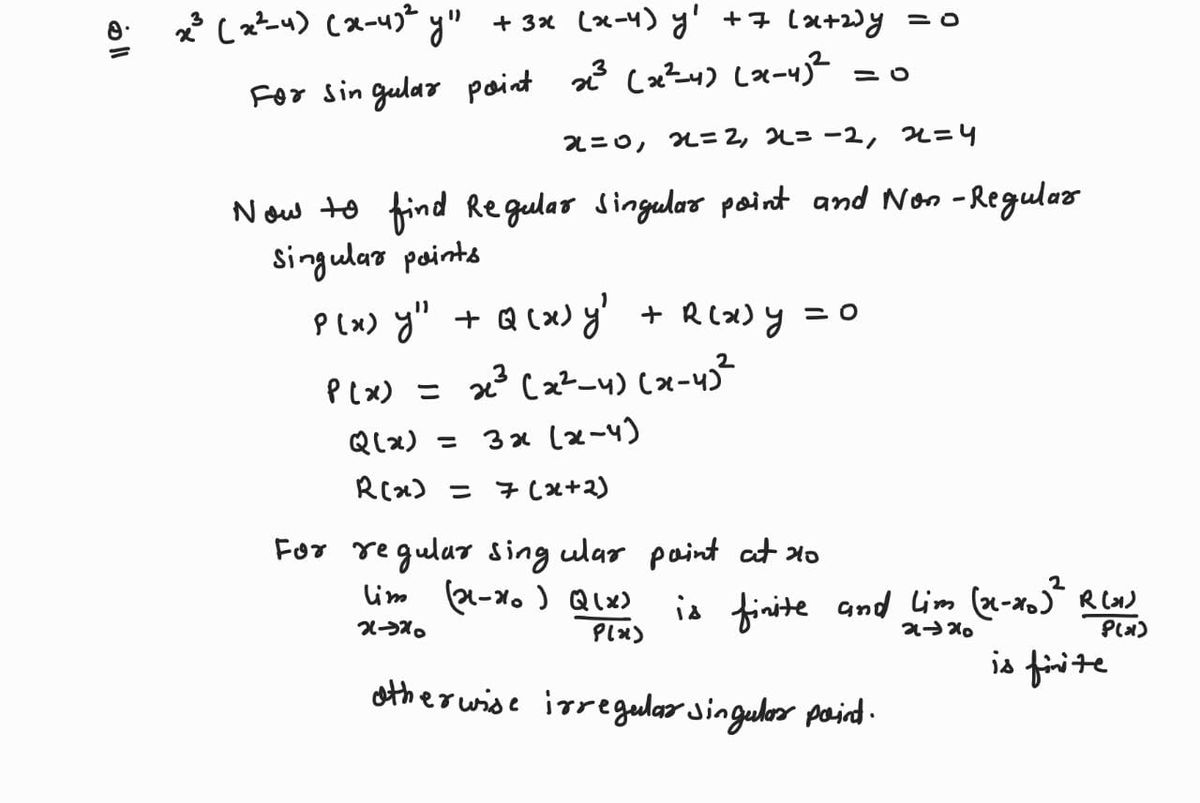Determine the singular points of the given differential equation. Classify each singular point as regular or irregular. (Enter your answers as a comma-separated list. Include both real and complex singular points. If there are no singular points in a certain category, enter NONE.) x³(x2 - 4)(x-4)²y" + 3x(x-4)y' + 7(x + 2)y = 0 regular singular points X= irregular singular points x= Need Help? Read It
Determine the singular points of the given differential equation. Classify each singular point as regular or irregular. (Enter your answers as a comma-separated list. Include both real and complex singular points. If there are no singular points in a certain category, enter NONE.) x³(x2 - 4)(x-4)²y" + 3x(x-4)y' + 7(x + 2)y = 0 regular singular points X= irregular singular points x= Need Help? Read It
Advanced Engineering Mathematics
10th Edition
ISBN:9780470458365
Author:Erwin Kreyszig
Publisher:Erwin Kreyszig
Chapter2: Second-order Linear Odes
Section: Chapter Questions
Problem 1RQ
Related questions
Question
100%
Ordinary differential equations, please type the final answer thank you
![**Title: Identifying Singular Points in Differential Equations**
**Instruction:**
Determine the singular points of the given differential equation. Classify each singular point as regular or irregular. (Enter your answers as a comma-separated list. Include both real and complex singular points. If there are no singular points in a certain category, enter NONE.)
**Equation:**
\[ x^2(x^2 - 4)(x - 4)^2y'' + 3(x(x - 4)y' + 7(x + 2)y = 0 \]
**Input Fields:**
- **Regular Singular Points:** \( x = \) [Input Box]
- **Irregular Singular Points:** \( x = \) [Input Box]
**Additional Resources:**
Need help? Click the button below:
- **Read It** [Button]](/v2/_next/image?url=https%3A%2F%2Fcontent.bartleby.com%2Fqna-images%2Fquestion%2Fe462800b-ac16-4590-bafb-82d68c005ec5%2F3b2ca68d-de27-4375-b906-214b989069f9%2F18ay2wd_processed.jpeg&w=3840&q=75)
Transcribed Image Text:**Title: Identifying Singular Points in Differential Equations**
**Instruction:**
Determine the singular points of the given differential equation. Classify each singular point as regular or irregular. (Enter your answers as a comma-separated list. Include both real and complex singular points. If there are no singular points in a certain category, enter NONE.)
**Equation:**
\[ x^2(x^2 - 4)(x - 4)^2y'' + 3(x(x - 4)y' + 7(x + 2)y = 0 \]
**Input Fields:**
- **Regular Singular Points:** \( x = \) [Input Box]
- **Irregular Singular Points:** \( x = \) [Input Box]
**Additional Resources:**
Need help? Click the button below:
- **Read It** [Button]
Expert Solution
Step 1

Step by step
Solved in 3 steps with 3 images

Recommended textbooks for you

Advanced Engineering Mathematics
Advanced Math
ISBN:
9780470458365
Author:
Erwin Kreyszig
Publisher:
Wiley, John & Sons, Incorporated

Numerical Methods for Engineers
Advanced Math
ISBN:
9780073397924
Author:
Steven C. Chapra Dr., Raymond P. Canale
Publisher:
McGraw-Hill Education

Introductory Mathematics for Engineering Applicat…
Advanced Math
ISBN:
9781118141809
Author:
Nathan Klingbeil
Publisher:
WILEY

Advanced Engineering Mathematics
Advanced Math
ISBN:
9780470458365
Author:
Erwin Kreyszig
Publisher:
Wiley, John & Sons, Incorporated

Numerical Methods for Engineers
Advanced Math
ISBN:
9780073397924
Author:
Steven C. Chapra Dr., Raymond P. Canale
Publisher:
McGraw-Hill Education

Introductory Mathematics for Engineering Applicat…
Advanced Math
ISBN:
9781118141809
Author:
Nathan Klingbeil
Publisher:
WILEY

Mathematics For Machine Technology
Advanced Math
ISBN:
9781337798310
Author:
Peterson, John.
Publisher:
Cengage Learning,

